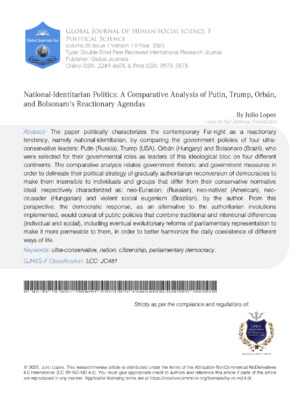National Identitarian Politics A Comparative Analysis of Putin Trump Orbán and Bolsonaros Reactionary Agendas
Keywords:
ultra-conservative, nation, citizenship, parliamentary democracy
Abstract
The paper politically characterizes the contemporary Far-right as a reactionary tendency namely nationalidentitarian by comparing the government policies of four ultra-conservative leaders Putin Russia Trump USA Orb n Hungary and Bolsonaro Brazil who were selected for their governmental roles as leaders of this ideological bloc on four different continents The comparative analysis relates government rhetoric and government measures in order to delineate their political strategy of gradually authoritarian reconversion of democracies to make them insensible to individuals and groups that differ from their conservative normative ideal respectively characterized as neo-Eurasian Russian neo-nativist American neo-crusader Hungarian and violent social eugenism Brazilian by the author From this perspective the democratic response as an alternative to the authoritarian involutions implemented would consist of public policies that combine traditional and intentional differences individual and social including eventual evolutionary reforms of parliamentary representation to make it more permeable to them in order to better harmonize the daily coexistence of different ways of life
Downloads
How to Cite
References

Published
2025-02-19
Issue
Section
License
Copyright (c) 2025 Authors and Global Journals Private Limited

This work is licensed under a Creative Commons Attribution 4.0 International License.